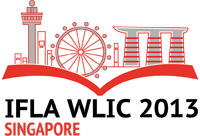Call for Papers
Information Literacy Section
& Reference and Information Services Section
Theme:
Re-defining and refining Information Literacy and Reference Services in the digital age
In today's digital age, reference services and information literacy (IL) are more interconnected and relevant than ever. Librarians are required to improve their own IL competency to provide better IL instruction to users, leading to increasingly digital-savvy users who are able to find information on their own. As a result, librarians are faced with fewer but more difficult reference enquiries. With the growth of digital materials, users are gaining more direct access to information - creating a shift in resources from reference services to IL, research assistance and outreach - a true challenge for reference services.
Additionally, the rapid development of digital and social media tools has brought about new innovations such as virtual reference, instant messaging, and other forms of online engagement—each of which brings its own challenges and opportunities.
Main Topics
We are interested in papers addressing the connections / interconnections between information literacy and reference services such as (but not limited to):
Role (integration) of information literacy in reference work
- Media literacy and reference work
- Civic literacy and reference work
- Transliteracy and reference work
- Metaliteracy and reference work
- E-literacy and reference work
- Digital literacy and reference work
- Computer literacy and reference work
- Scientific literacy and reference work
- Visual literacy and reference work
- Digital empowerment and reference work
Providing better reference services and improving librarians' information literacy competency
- Redirecting resources from reference services to user instruction, research assistance and outreach
- Deploying paraprofessionals in informational and instructional services
- Professional competencies of reference and information literacy librarians
- Training of information literacy and reference librarians
Providing better reference services and improving librarians' information literacy competency
- Redirecting resources from reference services to user instruction, research assistance and outreach
- Deploying paraprofessionals in informational and instructional services
- Professional competencies of reference and information literacy librarians
- Training of information literacy and reference librarians
Planning strategies for information literacy AND/OR reference services
- Branding, promotion and marketing
- Partnership and collaboration
- Collaborative relationships and strategic integration
- Complementary roles of librarians, teachers and parents
Papers addressing any topic related to information literacy AND/OR reference services from more than one perspective are also welcomed. The scope of the conference includes, but is not limited to the following areas:
- Impacts of technological developments on reference service, information literacy and outreach (e.g. web 2.0 ; web 3.0 ; mobile technologies ; trends, emerging technologies and innovation; growth of digital resources; gaming and application software (apps); digital reference tools; tiered reference services)
- Strategies in e-learning to promote self-directed and sustainable learning in the area of information literacy skills
- Developing effective and innovative information literacy instruction
- Supporting users need through library 2.0 and beyond
- Reframing information literacy as meta-literacy (media literacy, digital literacy, visual literacy, financial literacy, health literacy, cyber wellness)
- Measuring in information literacy instruction assessment
- Developing information literacy skills for the next generation: the complementary roles of librarians, teachers and parents
- Branding and promotion of information literacy in schools, organizations and communities
- Integrating information literacy into the curriculum
- Trends in reference services: cyber reference services, virtual reference services, mobile reference services, expert crowd sourcing, global reference volunteers
- Evaluation of reference services
- Issue of future reference services (e.g. commercial reference services, staff training, work fatigue and stress)
- Artificial intelligence for reference services (e.g. siri)
Paper Submission
We accept research reports, smaller scale interactive roundtable discussions, train-the-trainer workshops, pecha kucha and poster sessions.
First-time presenters and new professionals are encouraged to apply. Students are also invited to participate.
All proposals must be submitted by February 15, 2013 using the proposal submission form. [closed]
Important Dates
| Submission of Abstracts and Proposals | February 15, 2013 |
| Notification of acceptance | April 1, 2013 |
| Dissemination of final programme | May 1, 2013 |
| Deadline for authors to submit slides | July 22, 2013 |
| Satellite Meeting | August 15-16, 2013 |
More information
See the Conference website for additional details.
Submissions
All proposals must be in before 15 February 2013.
Please note
All expenses, including registration for the conference, travel, accommodation etc., are the responsibility of the authors/presenters. No financial support can be provided by IFLA, but a special invitation can be issued to authors.
Congress Attendance Grants
The Singapore National Committee and IFLA have worked hard to secure funds for Conference Participation Grants. Up-to-date information will be available on our Conference Participation Grants webpage.
Last update: 6 March 2013
---




